Importance of Academic Integrity: Business and Finance Perspective
VerifiedAdded on 2023/06/17
|6
|1457
|497
Report
AI Summary
This report examines the critical role of academic integrity and professional skills within the business and finance sectors. It highlights the importance of avoiding plagiarism, defining it as the use of others' work without proper attribution, and discusses various forms of plagiarism, including straight plagiarism, improper citation, and basic piracy. The report details the personal, ethical, and legal consequences of plagiarism, such as damage to reputation and career prospects. It emphasizes the significance of educational ethics in building trust and fostering honesty in business environments. Academic integrity, comprising honesty, respect, fairness, trust, and responsibility, is presented as essential for achieving professional goals and maintaining a positive business environment. The report concludes by advocating for the avoidance of academic dishonesty to promote a culture of integrity and ethical behavior, referencing strategies such as paraphrasing, proper citation, and the use of plagiarism detection tools. This document is available on Desklib, a platform offering a wide array of academic resources for students.
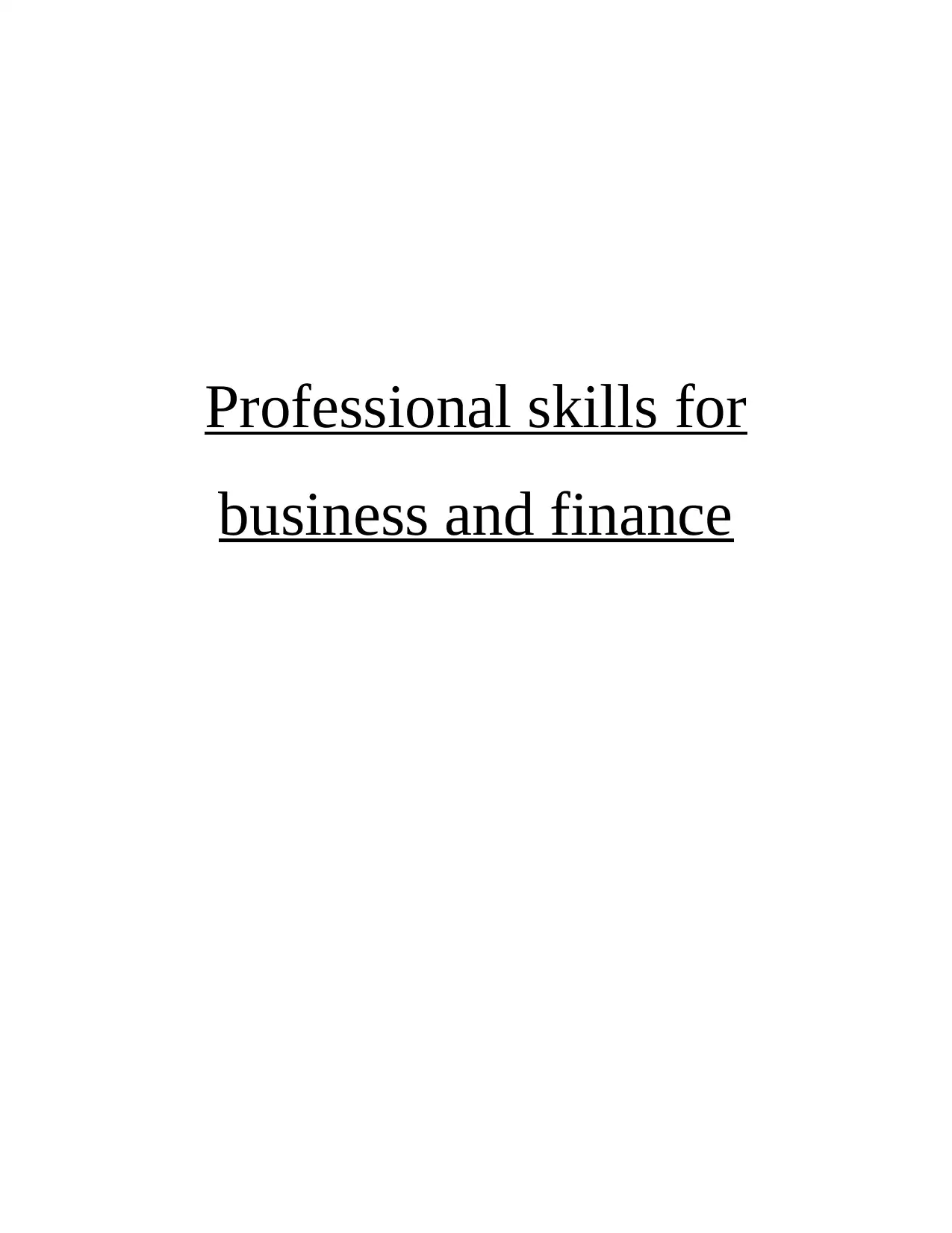
Professional skills for
business and finance
business and finance
Paraphrase This Document
Need a fresh take? Get an instant paraphrase of this document with our AI Paraphraser
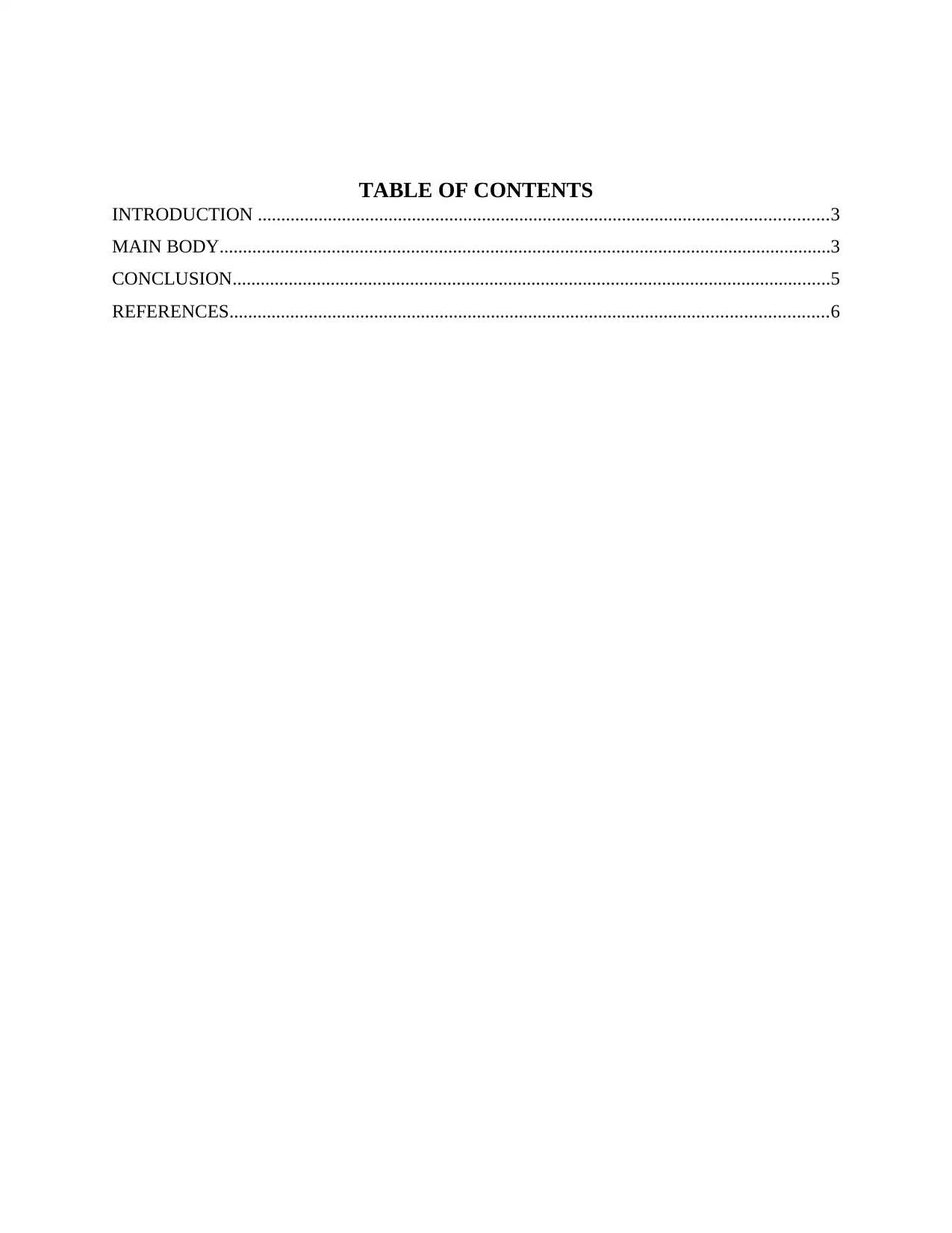
TABLE OF CONTENTS
INTRODUCTION ..........................................................................................................................3
MAIN BODY...................................................................................................................................3
CONCLUSION................................................................................................................................5
REFERENCES................................................................................................................................6
INTRODUCTION ..........................................................................................................................3
MAIN BODY...................................................................................................................................3
CONCLUSION................................................................................................................................5
REFERENCES................................................................................................................................6
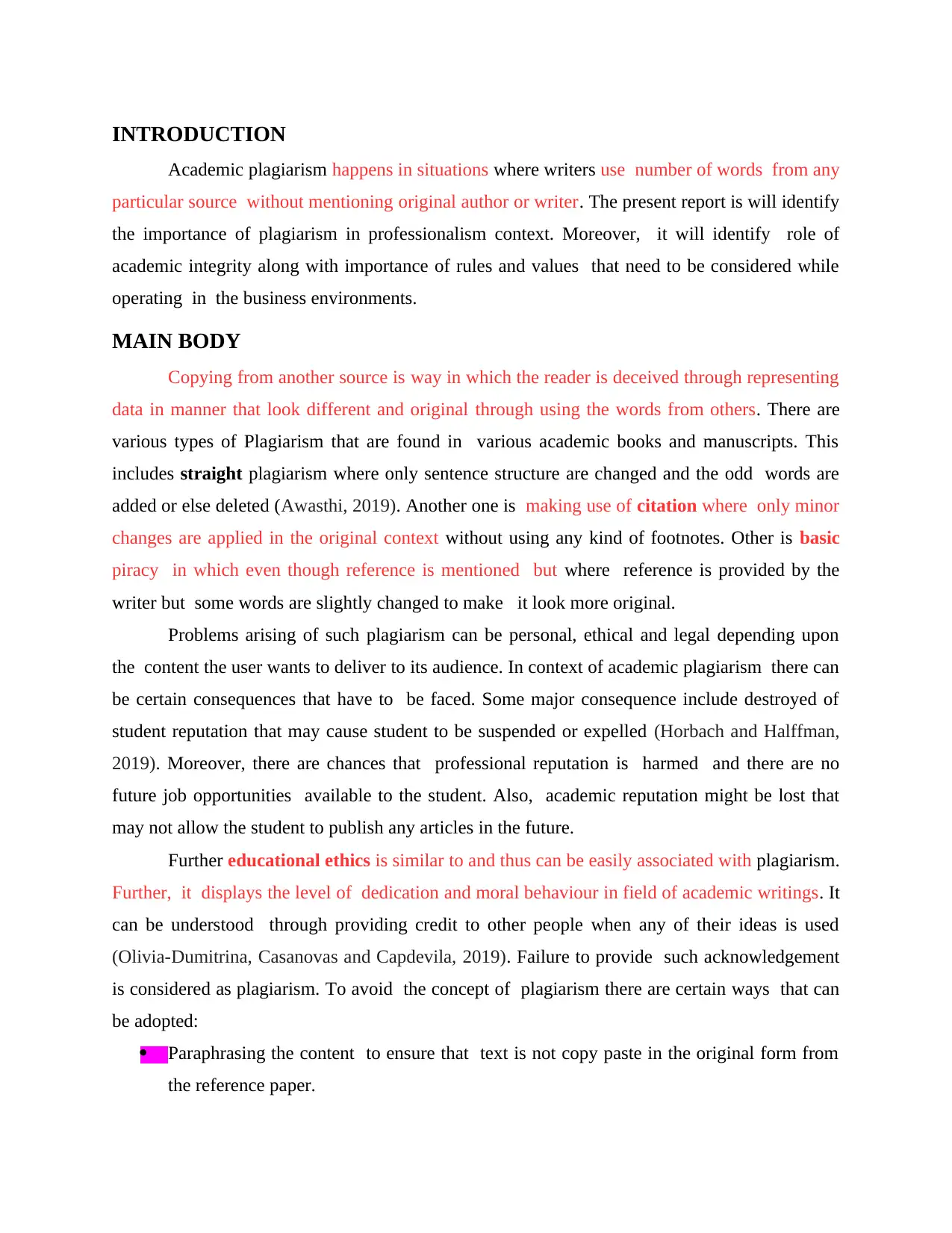
INTRODUCTION
Academic plagiarism happens in situations where writers use number of words from any
particular source without mentioning original author or writer. The present report is will identify
the importance of plagiarism in professionalism context. Moreover, it will identify role of
academic integrity along with importance of rules and values that need to be considered while
operating in the business environments.
MAIN BODY
Copying from another source is way in which the reader is deceived through representing
data in manner that look different and original through using the words from others. There are
various types of Plagiarism that are found in various academic books and manuscripts. This
includes straight plagiarism where only sentence structure are changed and the odd words are
added or else deleted (Awasthi, 2019). Another one is making use of citation where only minor
changes are applied in the original context without using any kind of footnotes. Other is basic
piracy in which even though reference is mentioned but where reference is provided by the
writer but some words are slightly changed to make it look more original.
Problems arising of such plagiarism can be personal, ethical and legal depending upon
the content the user wants to deliver to its audience. In context of academic plagiarism there can
be certain consequences that have to be faced. Some major consequence include destroyed of
student reputation that may cause student to be suspended or expelled (Horbach and Halffman,
2019). Moreover, there are chances that professional reputation is harmed and there are no
future job opportunities available to the student. Also, academic reputation might be lost that
may not allow the student to publish any articles in the future.
Further educational ethics is similar to and thus can be easily associated with plagiarism.
Further, it displays the level of dedication and moral behaviour in field of academic writings. It
can be understood through providing credit to other people when any of their ideas is used
(Olivia-Dumitrina, Casanovas and Capdevila, 2019). Failure to provide such acknowledgement
is considered as plagiarism. To avoid the concept of plagiarism there are certain ways that can
be adopted:
Paraphrasing the content to ensure that text is not copy paste in the original form from
the reference paper.
Academic plagiarism happens in situations where writers use number of words from any
particular source without mentioning original author or writer. The present report is will identify
the importance of plagiarism in professionalism context. Moreover, it will identify role of
academic integrity along with importance of rules and values that need to be considered while
operating in the business environments.
MAIN BODY
Copying from another source is way in which the reader is deceived through representing
data in manner that look different and original through using the words from others. There are
various types of Plagiarism that are found in various academic books and manuscripts. This
includes straight plagiarism where only sentence structure are changed and the odd words are
added or else deleted (Awasthi, 2019). Another one is making use of citation where only minor
changes are applied in the original context without using any kind of footnotes. Other is basic
piracy in which even though reference is mentioned but where reference is provided by the
writer but some words are slightly changed to make it look more original.
Problems arising of such plagiarism can be personal, ethical and legal depending upon
the content the user wants to deliver to its audience. In context of academic plagiarism there can
be certain consequences that have to be faced. Some major consequence include destroyed of
student reputation that may cause student to be suspended or expelled (Horbach and Halffman,
2019). Moreover, there are chances that professional reputation is harmed and there are no
future job opportunities available to the student. Also, academic reputation might be lost that
may not allow the student to publish any articles in the future.
Further educational ethics is similar to and thus can be easily associated with plagiarism.
Further, it displays the level of dedication and moral behaviour in field of academic writings. It
can be understood through providing credit to other people when any of their ideas is used
(Olivia-Dumitrina, Casanovas and Capdevila, 2019). Failure to provide such acknowledgement
is considered as plagiarism. To avoid the concept of plagiarism there are certain ways that can
be adopted:
Paraphrasing the content to ensure that text is not copy paste in the original form from
the reference paper.
⊘ This is a preview!⊘
Do you want full access?
Subscribe today to unlock all pages.

Trusted by 1+ million students worldwide
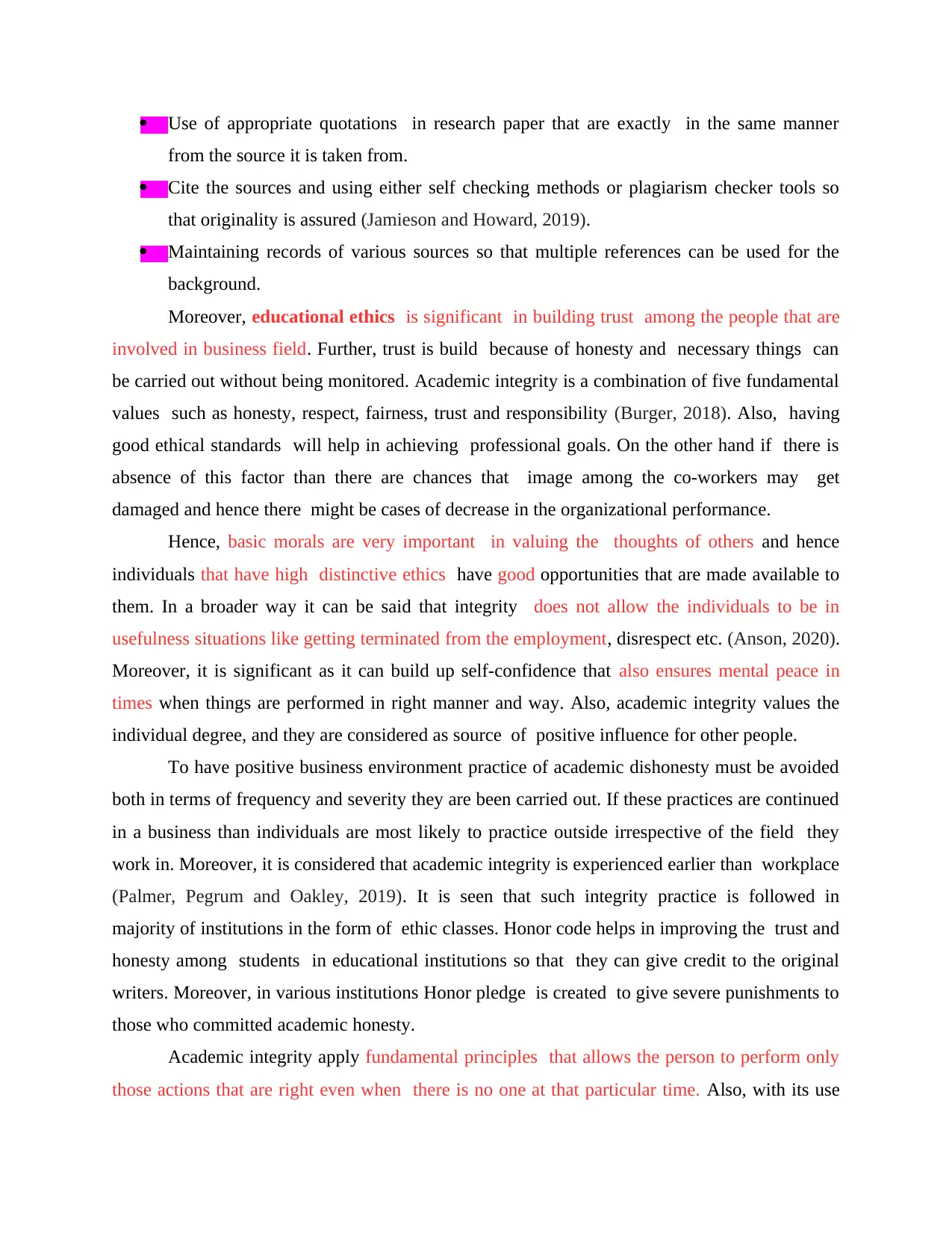
Use of appropriate quotations in research paper that are exactly in the same manner
from the source it is taken from.
Cite the sources and using either self checking methods or plagiarism checker tools so
that originality is assured (Jamieson and Howard, 2019).
Maintaining records of various sources so that multiple references can be used for the
background.
Moreover, educational ethics is significant in building trust among the people that are
involved in business field. Further, trust is build because of honesty and necessary things can
be carried out without being monitored. Academic integrity is a combination of five fundamental
values such as honesty, respect, fairness, trust and responsibility (Burger, 2018). Also, having
good ethical standards will help in achieving professional goals. On the other hand if there is
absence of this factor than there are chances that image among the co-workers may get
damaged and hence there might be cases of decrease in the organizational performance.
Hence, basic morals are very important in valuing the thoughts of others and hence
individuals that have high distinctive ethics have good opportunities that are made available to
them. In a broader way it can be said that integrity does not allow the individuals to be in
usefulness situations like getting terminated from the employment, disrespect etc. (Anson, 2020).
Moreover, it is significant as it can build up self-confidence that also ensures mental peace in
times when things are performed in right manner and way. Also, academic integrity values the
individual degree, and they are considered as source of positive influence for other people.
To have positive business environment practice of academic dishonesty must be avoided
both in terms of frequency and severity they are been carried out. If these practices are continued
in a business than individuals are most likely to practice outside irrespective of the field they
work in. Moreover, it is considered that academic integrity is experienced earlier than workplace
(Palmer, Pegrum and Oakley, 2019). It is seen that such integrity practice is followed in
majority of institutions in the form of ethic classes. Honor code helps in improving the trust and
honesty among students in educational institutions so that they can give credit to the original
writers. Moreover, in various institutions Honor pledge is created to give severe punishments to
those who committed academic honesty.
Academic integrity apply fundamental principles that allows the person to perform only
those actions that are right even when there is no one at that particular time. Also, with its use
from the source it is taken from.
Cite the sources and using either self checking methods or plagiarism checker tools so
that originality is assured (Jamieson and Howard, 2019).
Maintaining records of various sources so that multiple references can be used for the
background.
Moreover, educational ethics is significant in building trust among the people that are
involved in business field. Further, trust is build because of honesty and necessary things can
be carried out without being monitored. Academic integrity is a combination of five fundamental
values such as honesty, respect, fairness, trust and responsibility (Burger, 2018). Also, having
good ethical standards will help in achieving professional goals. On the other hand if there is
absence of this factor than there are chances that image among the co-workers may get
damaged and hence there might be cases of decrease in the organizational performance.
Hence, basic morals are very important in valuing the thoughts of others and hence
individuals that have high distinctive ethics have good opportunities that are made available to
them. In a broader way it can be said that integrity does not allow the individuals to be in
usefulness situations like getting terminated from the employment, disrespect etc. (Anson, 2020).
Moreover, it is significant as it can build up self-confidence that also ensures mental peace in
times when things are performed in right manner and way. Also, academic integrity values the
individual degree, and they are considered as source of positive influence for other people.
To have positive business environment practice of academic dishonesty must be avoided
both in terms of frequency and severity they are been carried out. If these practices are continued
in a business than individuals are most likely to practice outside irrespective of the field they
work in. Moreover, it is considered that academic integrity is experienced earlier than workplace
(Palmer, Pegrum and Oakley, 2019). It is seen that such integrity practice is followed in
majority of institutions in the form of ethic classes. Honor code helps in improving the trust and
honesty among students in educational institutions so that they can give credit to the original
writers. Moreover, in various institutions Honor pledge is created to give severe punishments to
those who committed academic honesty.
Academic integrity apply fundamental principles that allows the person to perform only
those actions that are right even when there is no one at that particular time. Also, with its use
Paraphrase This Document
Need a fresh take? Get an instant paraphrase of this document with our AI Paraphraser
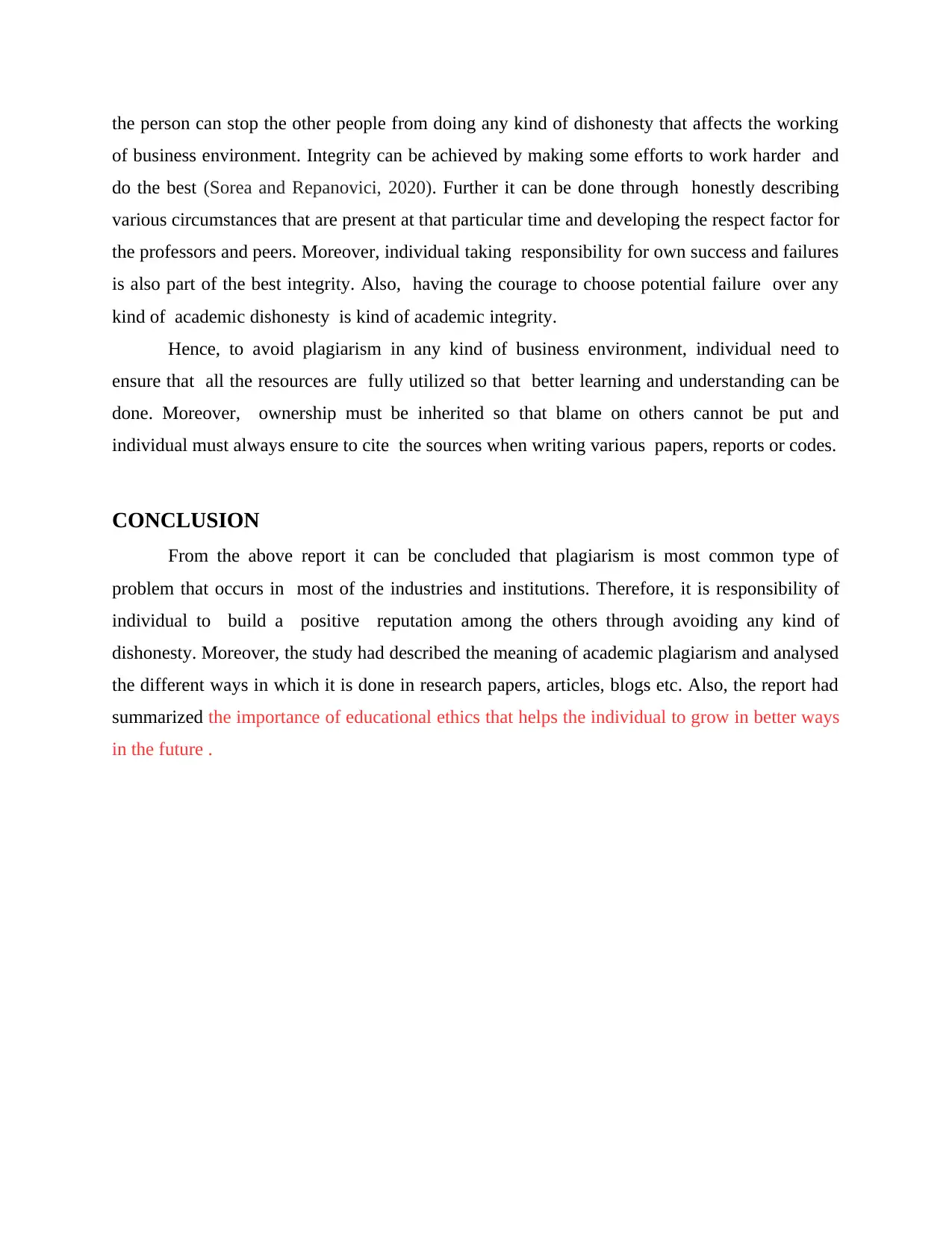
the person can stop the other people from doing any kind of dishonesty that affects the working
of business environment. Integrity can be achieved by making some efforts to work harder and
do the best (Sorea and Repanovici, 2020). Further it can be done through honestly describing
various circumstances that are present at that particular time and developing the respect factor for
the professors and peers. Moreover, individual taking responsibility for own success and failures
is also part of the best integrity. Also, having the courage to choose potential failure over any
kind of academic dishonesty is kind of academic integrity.
Hence, to avoid plagiarism in any kind of business environment, individual need to
ensure that all the resources are fully utilized so that better learning and understanding can be
done. Moreover, ownership must be inherited so that blame on others cannot be put and
individual must always ensure to cite the sources when writing various papers, reports or codes.
CONCLUSION
From the above report it can be concluded that plagiarism is most common type of
problem that occurs in most of the industries and institutions. Therefore, it is responsibility of
individual to build a positive reputation among the others through avoiding any kind of
dishonesty. Moreover, the study had described the meaning of academic plagiarism and analysed
the different ways in which it is done in research papers, articles, blogs etc. Also, the report had
summarized the importance of educational ethics that helps the individual to grow in better ways
in the future .
of business environment. Integrity can be achieved by making some efforts to work harder and
do the best (Sorea and Repanovici, 2020). Further it can be done through honestly describing
various circumstances that are present at that particular time and developing the respect factor for
the professors and peers. Moreover, individual taking responsibility for own success and failures
is also part of the best integrity. Also, having the courage to choose potential failure over any
kind of academic dishonesty is kind of academic integrity.
Hence, to avoid plagiarism in any kind of business environment, individual need to
ensure that all the resources are fully utilized so that better learning and understanding can be
done. Moreover, ownership must be inherited so that blame on others cannot be put and
individual must always ensure to cite the sources when writing various papers, reports or codes.
CONCLUSION
From the above report it can be concluded that plagiarism is most common type of
problem that occurs in most of the industries and institutions. Therefore, it is responsibility of
individual to build a positive reputation among the others through avoiding any kind of
dishonesty. Moreover, the study had described the meaning of academic plagiarism and analysed
the different ways in which it is done in research papers, articles, blogs etc. Also, the report had
summarized the importance of educational ethics that helps the individual to grow in better ways
in the future .
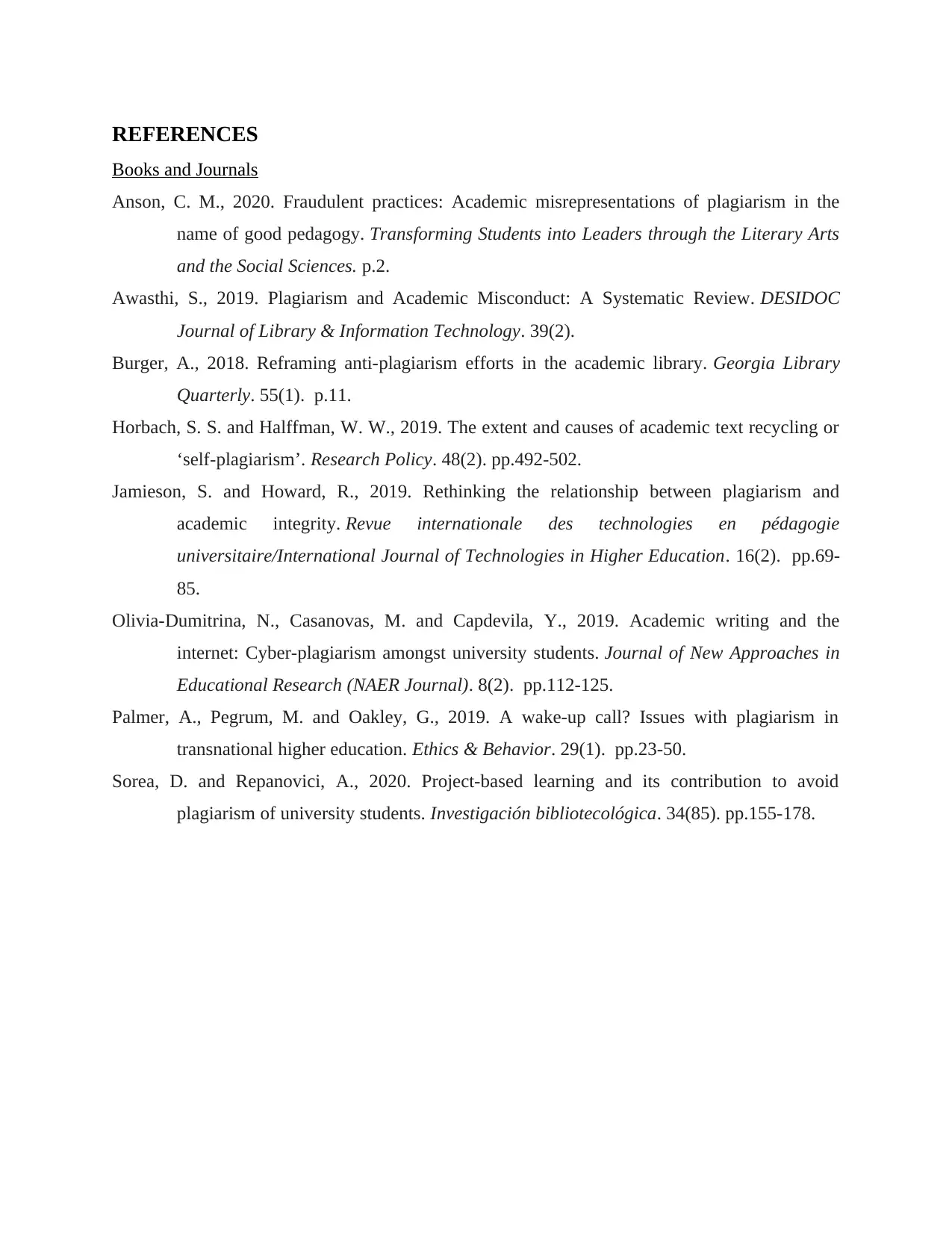
REFERENCES
Books and Journals
Anson, C. M., 2020. Fraudulent practices: Academic misrepresentations of plagiarism in the
name of good pedagogy. Transforming Students into Leaders through the Literary Arts
and the Social Sciences. p.2.
Awasthi, S., 2019. Plagiarism and Academic Misconduct: A Systematic Review. DESIDOC
Journal of Library & Information Technology. 39(2).
Burger, A., 2018. Reframing anti-plagiarism efforts in the academic library. Georgia Library
Quarterly. 55(1). p.11.
Horbach, S. S. and Halffman, W. W., 2019. The extent and causes of academic text recycling or
‘self-plagiarism’. Research Policy. 48(2). pp.492-502.
Jamieson, S. and Howard, R., 2019. Rethinking the relationship between plagiarism and
academic integrity. Revue internationale des technologies en pédagogie
universitaire/International Journal of Technologies in Higher Education. 16(2). pp.69-
85.
Olivia-Dumitrina, N., Casanovas, M. and Capdevila, Y., 2019. Academic writing and the
internet: Cyber-plagiarism amongst university students. Journal of New Approaches in
Educational Research (NAER Journal). 8(2). pp.112-125.
Palmer, A., Pegrum, M. and Oakley, G., 2019. A wake-up call? Issues with plagiarism in
transnational higher education. Ethics & Behavior. 29(1). pp.23-50.
Sorea, D. and Repanovici, A., 2020. Project-based learning and its contribution to avoid
plagiarism of university students. Investigación bibliotecológica. 34(85). pp.155-178.
Books and Journals
Anson, C. M., 2020. Fraudulent practices: Academic misrepresentations of plagiarism in the
name of good pedagogy. Transforming Students into Leaders through the Literary Arts
and the Social Sciences. p.2.
Awasthi, S., 2019. Plagiarism and Academic Misconduct: A Systematic Review. DESIDOC
Journal of Library & Information Technology. 39(2).
Burger, A., 2018. Reframing anti-plagiarism efforts in the academic library. Georgia Library
Quarterly. 55(1). p.11.
Horbach, S. S. and Halffman, W. W., 2019. The extent and causes of academic text recycling or
‘self-plagiarism’. Research Policy. 48(2). pp.492-502.
Jamieson, S. and Howard, R., 2019. Rethinking the relationship between plagiarism and
academic integrity. Revue internationale des technologies en pédagogie
universitaire/International Journal of Technologies in Higher Education. 16(2). pp.69-
85.
Olivia-Dumitrina, N., Casanovas, M. and Capdevila, Y., 2019. Academic writing and the
internet: Cyber-plagiarism amongst university students. Journal of New Approaches in
Educational Research (NAER Journal). 8(2). pp.112-125.
Palmer, A., Pegrum, M. and Oakley, G., 2019. A wake-up call? Issues with plagiarism in
transnational higher education. Ethics & Behavior. 29(1). pp.23-50.
Sorea, D. and Repanovici, A., 2020. Project-based learning and its contribution to avoid
plagiarism of university students. Investigación bibliotecológica. 34(85). pp.155-178.
⊘ This is a preview!⊘
Do you want full access?
Subscribe today to unlock all pages.

Trusted by 1+ million students worldwide
1 out of 6
Related Documents
Your All-in-One AI-Powered Toolkit for Academic Success.
+13062052269
info@desklib.com
Available 24*7 on WhatsApp / Email
![[object Object]](/_next/static/media/star-bottom.7253800d.svg)
Unlock your academic potential
Copyright © 2020–2025 A2Z Services. All Rights Reserved. Developed and managed by ZUCOL.



